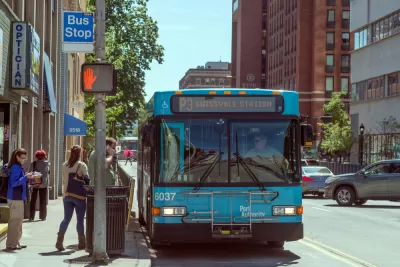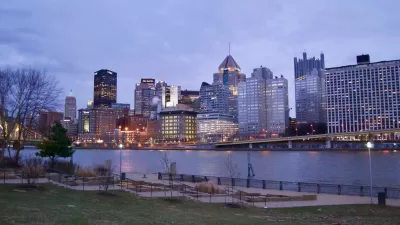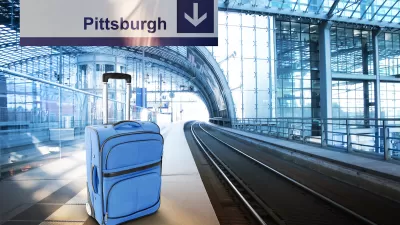After four years of delays, the agency is ready to implement a five-year plan setting the foundation for its long-term goals to improve and expand service.

As Ed Blazina reports in the Pittsburgh Post-Gazette, Pittsburgh Regional Transit has completed a five-year internal strategic plan to improve service as part of its long-range 25-year plan, approved by the Port Authority of Allegheny County last year. “The plan not only sets core values — such as providing clean, efficient and courteous service and expanding it to meet the needs of riders — but it also sets goals for reaching certain benchmarks and will provide training so employees are equipped to meet those goals.”
According to the agency’s Chief Strategy Officer Donny Hamilton Jr., accountability is one of the major goals of the plan. “By 2027-28, we’ll be trying to show results.” Long-term plans include extending the T light rail system, adding bus-only lanes, and extending existing busways.
“The agency also wants to keep its focus on equity, both in terms of the service it provides and the role it plays in the community as a major employer that has more than 2,700 employees and spends more than $600 million a year in capital and operating expenses.”

Study: Maui’s Plan to Convert Vacation Rentals to Long-Term Housing Could Cause Nearly $1 Billion Economic Loss
The plan would reduce visitor accommodation by 25,% resulting in 1,900 jobs lost.

North Texas Transit Leaders Tout Benefits of TOD for Growing Region
At a summit focused on transit-oriented development, policymakers discussed how North Texas’ expanded light rail system can serve as a tool for economic growth.

Using Old Oil and Gas Wells for Green Energy Storage
Penn State researchers have found that repurposing abandoned oil and gas wells for geothermal-assisted compressed-air energy storage can boost efficiency, reduce environmental risks, and support clean energy and job transitions.

From Blight to Benefit: Early Results From California’s Equitable Cleanup Program
The Equitable Community Revitalization Grant (ECRG) program is reshaping brownfield redevelopment by prioritizing projects in low-income and environmental justice communities, emphasizing equity, transparency, and community benefits.

Planting Relief: Tackling Las Vegas Heat One Tree at a Time
Nevada Plants, a Las Vegas-based nonprofit, is combating the city’s extreme urban heat by giving away trees to residents in underserved neighborhoods, promoting shade, sustainability, and community health.

How Madison’s Tree Planting Efforts Are Growing a Healthier Community
Madison’s annual tree planting initiative is enhancing environmental resilience, public health, and community livability by adding 1,400 carefully selected trees citywide, with strong community and institutional support for urban forestry.
Urban Design for Planners 1: Software Tools
This six-course series explores essential urban design concepts using open source software and equips planners with the tools they need to participate fully in the urban design process.
Planning for Universal Design
Learn the tools for implementing Universal Design in planning regulations.
Ascent Environmental
Borough of Carlisle
Institute for Housing and Urban Development Studies (IHS)
City of Grandview
Harvard GSD Executive Education
Toledo-Lucas County Plan Commissions
Salt Lake City
NYU Wagner Graduate School of Public Service





























